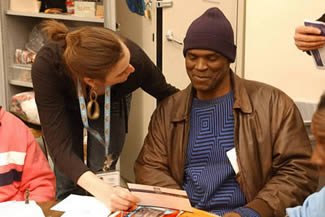BALTIMORE — There were over 4,000 adults and children homeless in Baltimore City according to a survey conducted in 2011.
Experts say that number has only increased in 2013 as more people have fallen victim to a shaky economy and unemployment. “Health Care for the Homeless” is an organization that has been fighting homelessness in Baltimore for almost 30 years.
Located at 421 Fallsway in Baltimore, Health Care for the Homeless is staffed with professionals who provide mental health services, medical care, addiction treatment and social services, as well as extensive dental services for homeless adults and children. In addition, the organization offers a permanent supportive housing program, which serves to house and provide the life skills for clients to maintain stability.
Adam Schneider, director of communications says, “Housing is the foundation that is built around what we do here at Health Care for the Homeless. A home is what stabilizes the client to focus on other necessities such obtaining a job and providing for themselves as well as their family. If the organization can get people into a stable living environment, provide supportive services that can keep that individual permanently housed, then that is the start to a new life.”
Dontae Johnson, a Baltimore native who was homeless for two years, is a grateful client of the organization. An untreated mental health issue prevented Johnson from holding a job, which led to eviction from his apartment. Johnson says, “When I was homeless I would sleep in abandoned homes or deep in wooded areas where no one could find me. I was in a period of depression and had lack of direction. Being homeless became my lifestyle and I would wander through the streets in search for food. Then one day I was speaking to a woman at Our Daily Bread about my situation and she told me about Health Care for the Homeless.”
That conversation changed the trajectory of Johnson’s life. He went to Health Care for the Homeless where his mental health issue was diagnosed and treated by experts. In addition, he received regular counseling and support which allowed him to embrace a new home with a family member.
No longer homeless, Johnson says, “Health Care for the Homeless gave me a lot of hope and I feel much better about myself. I have reestablished family connections, I communicate and spend a lot more time with my family and it makes me feel good. Prior to coming to the organization, I was in a stage of disorder and depression, but now I have found the strength to live.”
Spokesman Adam Schneider says, “I’m very proud to work here because the organization tries to model the type of community or society we as staff want to live in. We recognize it is critically important to meet the needs of the clients with a direct approach and service in order to provide treatment and prevent a cycle. I’ve found meaning in my life through the lives of others I have encountered while working here.”
To learn more about Health Care for Homeless or to make a donation to the organization, visit: http://www.hchmd.org/.
